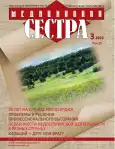Методы повышения качества образования в разных странах
- Авторы: Шамилов М.Д.1
-
Учреждения:
- Уральский государственный медицинский университет
- Выпуск: Том 25, № 3 (2023)
- Страницы: 27-30
- Раздел: Образование: проблемы и решения
- URL: https://journals.eco-vector.com/0025-8342/article/view/430184
- DOI: https://doi.org/10.29296/25879979-2023-03-05
- ID: 430184
Цитировать
Полный текст
Аннотация
Обучение – это организованная познавательная деятельность, как преподавателя, так и студента, которая включает ряд познавательных психических процессов– восприятие, память, мышление, воображение и доступную передачу накопленных знаний, необходимых для решения специальных высококвалифицированных процессов в медицине. Решая вопросы повышения качества образования возможно использовать последовательность некоторых этапов познавательного процесса – это возникновение проблемной ситуации в учебе, проведение анализа ситуации, попытка решения данной проблемы известными способами и необходимость провести поиск новых способов решения, что позволит улучшить качество образовательного процесса в медицинских учебных заведениях.
Ключевые слова
Полный текст
Об авторах
Марк Дамирович Шамилов
Уральский государственный медицинский университет
Автор, ответственный за переписку.
Email: oksana.nemyatyh@pharminnotech.com
ORCID iD: 0009-0009-0197-8354
студент 4 курса лечебно-профилактического факультета
Россия, ЕкатеринбургСписок литературы
- Мотова Г.Н., Наводнов В.Г. Экспертиза качества образования:европейский подход.- М.: Национальное аккредитационное агентство в сфере образования, 2008.- 100с.
- Науменко Ю.В. Рейтинг учебных заведений как элемент здоровьеформирующего образования. Стандарты и мониторинг в образовании. 2006; 2: 23–30.
- Сазонов Б.А. Балльно-рейтинговые системы оценивания знаний и обеспечение качества учебного процесса. Высшее образование России.2012; 6: 28–40.
- Карсонов В.А. Современные педагогические технологии. Саратов, 2004- 120с.
- Хабибулина М.М. Развитие креативного мышления у студентов медицинского ВУЗа. Вестник Уральского государственного медицинского университета. 2020; 4: 22–23.
- Чернядьев С.А., Уфимцева М.А., Гетманова А.В., Ушаков А.А., Хабибулина М.М. Роль NEW MEDIA в образовании студентов медицинского ВУЗа. Современные наукоемкие технологии. 2016; 2–3: 589–592.
- Шамилов М.Д. Влияние мотивации студентов – медиков на качество образования. Медицинская сестра.2022; 24(6): 16–19.
- Боровская Н.В., Реан А.А. Педагогика: учебное пособие. СПб.: Питер, 2016.-304 с.
- Амлаев К., Хорошилова Е. Управление социально-экономическими детерминантами здоровья на различных уровнях. Врач 2018; (1): 85–87.
- Хабибулина М.М. Деятельность преподавателя в процессе воспитания. Медицинская сестра. 2022; 24(4): 31–33.
- Айсмонтас Б.Б. Педагогическая психология: Схемы и тесты. – М.: Изд-во ВЛАДОС-ПРЕСС, 2004. – 208 с.
- Шамилов М.Д. Мнение студентов и пациентов о профессиональных качествах врача. Медицинская сестра. 2022; 24(8): 32–34.
- Амлаев К., Дахкильгова Х. Меры по повышению грамотности в вопросах здоровья. Врач 2018; (12): 83–87.
- Хабибулина М.М. Педагогические методы оптимизации учебного процесса в медицинском вузе. Вестник Уральского государственного медицинского университета. 2022; 56(1): 68–71.
- Боброва Л.Н. Рейтинговая система оценки качества обучения. Наука и школа. 2005; (6): 2–4.
- Matthew R. Imm, Gauri Agarwal, Chi Zhang, Amar R. Deshpande, Barry Issenberg & Latha Chandran (2023) EPMO: A novel medical student assessment tool that integrates entrustable professional activities, prime, and the modified Ottawa coactivity scale, Medical Teacher, 45: 4, 419-425, doi: 10.1080/0142159X.2022.2137012 https://www.tandfonline.com/toc/imte20/current
- Evans LV, Dodge KL, Shah TD, Kaplan LJ, Siegel MD, Moore CL, Hamann CJ, Lin Z, D’Onofrio G. Simulation training in central venous catheter insertion: improved performance in clinical practice. Acad Med. 2010 Sep;85(9):1462-9. doi: 10.1097/ACM.0b013e3181eac9a3. PMID: 20736674. https://www.researchgate.net/publication/45827895_Simulation_Training_in_Central_Venous_Catheter_Insertion_Improved_Performance_in_Clinical_Practice
- Majumder AA, D’Souza U, Rahman S. Trends in medical education: challenges and directions for need-based reforms of medical training in South-East Asia. Indian J Med Sci. 2004 Sep;58(9):369-80. PMID: 15470278. https://www.researchgate.net/publication/8246017_Trends_in_medical_education_Challenges_and_directions_for_need-based_reforms_of_medical_training_in_South-East_Asia
- Wang, W. Medical education in china: progress in the past 70 years and a vision for the future. BMC Med Educ 21, 453 (2021). https://doi.org/10.1186/s12909-021-02875-6 https://bmcmededuc.biomedcentral.com/articles/10.1186/s12909-021-02875-6
- Anjali Solanki & Surender Kashyap (2014) Medical education in India: Current challenges and the way forward, Medical Teacher, 36:12, 1027-031, doi: 10.3109/0142159X.2014.927574 https://www.researchgate.net/publication/265392776_Medical_education_in_India_Current_challenges_and_the_way_forward
- С.А. Золотарева Метод «Перевернутого класса»: история и опыт применения // МНКО. 2022. №2 (93). URL: https://cyberleninka.ru/article/n/metod-perevernutogo-klassa-istoriya-i-opyt-primeneniya (дата обращения: 12.04.2023).
Дополнительные файлы






